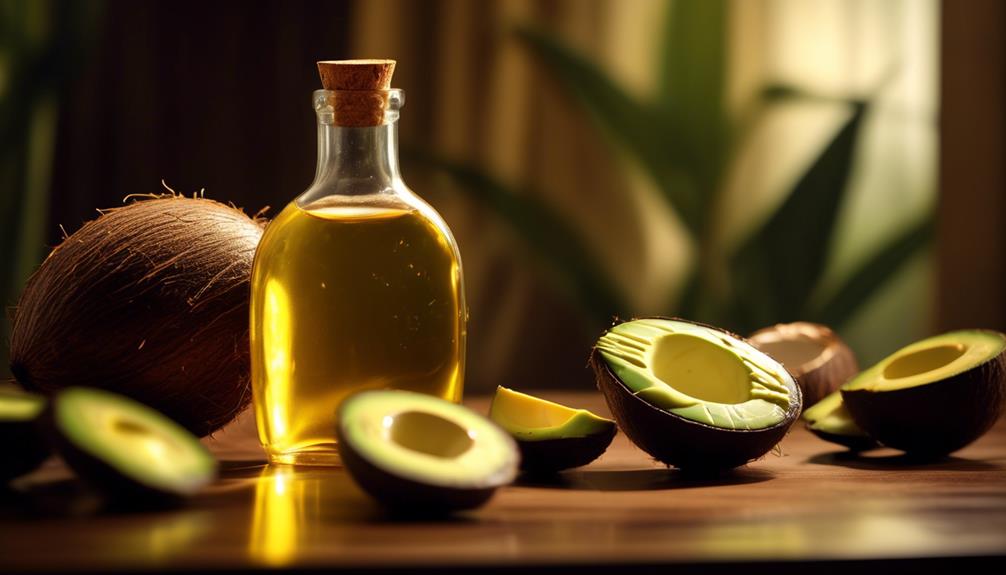You've embarked on a keto journey, diligently watching your carb intake and reaping the benefits of weight loss and increased energy. But what about your cholesterol levels? Maintaining a healthy balance is crucial for overall well-being.
Fortunately, there are a variety of keto supplements that can help support your cholesterol levels. From omega-3 fatty acids to green tea extract, these top 10 supplements offer a natural and effective way to promote heart health.
So, if you're curious to discover which ones made the cut, keep reading to uncover the secrets of maintaining healthy cholesterol levels on your keto diet.
Omega-3 Fatty Acids

To optimize your cholesterol levels while on a keto diet, incorporating omega-3 fatty acids into your daily supplement routine is essential. Omega-3 fatty acids are crucial for maintaining heart health and reducing the risk of cardiovascular diseases. These healthy fats have been shown to lower triglyceride levels, decrease inflammation, and improve overall heart function.
There are several sources of omega-3 fatty acids that you can include in your diet. Fatty fish like salmon, mackerel, and sardines are excellent sources of EPA (eicosapentaenoic acid) and DHA (docosahexaenoic acid), which are two types of omega-3 fatty acids. If you're not a fan of fish, you can also obtain omega-3s from plant-based sources such as flaxseeds, chia seeds, and walnuts. These plant-based sources contain ALA (alpha-linolenic acid), which is converted into EPA and DHA in the body.
While it's possible to get omega-3 fatty acids from food alone, incorporating a high-quality omega-3 supplement into your routine can ensure that you're meeting your daily requirements. Look for supplements that are derived from fish oil or algae, as they're rich in EPA and DHA. Remember to consult with a healthcare professional before starting any new supplement regimen, especially if you have any underlying health conditions or are taking medications.
Coenzyme Q10
Incorporating Coenzyme Q10 into your daily supplement routine can further support your heart health on a keto diet. Coenzyme Q10, also known as CoQ10, is a powerful antioxidant that plays a crucial role in energy production and acts as a protective agent against oxidative stress.
When following a keto diet, which is high in fat and low in carbohydrates, your body undergoes a metabolic shift and relies on fats for energy. This can potentially increase oxidative stress and affect heart health.
By including Coenzyme Q10 in your supplement regimen, you can reap the following benefits:
- Enhanced cardiovascular function: CoQ10 supports the health of your heart by helping it generate the necessary energy it needs to pump blood effectively.
- Reduced inflammation: Coenzyme Q10 has been shown to have anti-inflammatory properties, which can help reduce the risk of cardiovascular diseases.
- Improved cholesterol levels: Studies have suggested that CoQ10 supplementation can help improve cholesterol profiles, including increasing levels of beneficial HDL cholesterol and reducing levels of harmful LDL cholesterol.
When choosing a CoQ10 supplement, it's important to opt for reputable brands known for their quality and purity. Some of the best CoQ10 brands include Nature Made, Qunol, and Doctor's Best.
Remember to consult with your healthcare provider before starting any new supplements to ensure they're safe and appropriate for your individual needs.
Fiber Supplements

Now let's talk about fiber supplements and their importance in maintaining healthy cholesterol levels.
You may be wondering why dietary fiber is crucial for your health. Well, fiber helps to lower LDL cholesterol levels, reduce the risk of heart disease, and promote a healthy digestive system.
There are different types of fiber supplements available, such as psyllium husk and glucomannan, which can provide you with these benefits.
Importance of Dietary Fiber
Including dietary fiber in your keto diet can play a vital role in maintaining healthy cholesterol levels. Fiber rich foods are an excellent source of essential nutrients that can support your overall health. Soluble fiber, in particular, offers numerous benefits for your cholesterol levels.
Here are three reasons why incorporating dietary fiber into your keto diet is important:
- Lowers LDL cholesterol: Soluble fiber binds to cholesterol and prevents it from being absorbed into the bloodstream, helping to reduce LDL (bad) cholesterol levels.
- Promotes heart health: Consuming fiber rich foods can reduce the risk of heart disease by lowering blood pressure and reducing inflammation.
- Maintains healthy weight: Fiber helps you feel full and satisfied, promoting weight management and reducing the risk of obesity-related cholesterol issues.
Types of Fiber Supplements
To explore the different types of fiber supplements that can be beneficial for maintaining healthy cholesterol levels, let's now shift our focus to Fiber Supplements.
There are several types of fiber supplements available in the market that can help improve your cholesterol levels. One common type is psyllium husk, which is a soluble fiber supplement. It works by binding to cholesterol in the digestive system and preventing its absorption into the bloodstream.
Another type is glucomannan, a soluble fiber derived from the konjac plant. It has been shown to reduce LDL cholesterol levels and improve overall heart health.
Insoluble fiber supplements, such as wheat bran and cellulose, can also be effective in lowering cholesterol levels. These supplements work by increasing the bulk of stool, promoting regular bowel movements, and reducing the absorption of cholesterol from food.
Incorporating fiber supplements into your diet can provide several benefits for maintaining healthy cholesterol levels.
Benefits of Fiber Supplements
Fiber supplements offer numerous benefits for maintaining healthy cholesterol levels. They help you feel fuller for longer, reducing cravings and preventing overeating. By adding bulk to your diet, fiber supplements also aid in digestion, promoting regular bowel movements and preventing constipation.
Additionally, fiber supplements can improve digestive health by nourishing the beneficial bacteria in your gut. This helps to maintain a healthy balance of gut flora, which is essential for optimal digestion and nutrient absorption.
MCT Oil

Now let's talk about MCT Oil.
You're probably wondering about its benefits, the recommended dosage, and the best brands to choose from.
Well, we've got you covered.
In the following points, we'll explore the advantages of MCT, provide dosage recommendations, and recommend some top-notch MCT oil brands for you to try.
Benefits of MCT
MCT oil offers a range of benefits for improving your health and well-being. Here are a few key advantages of incorporating MCT oil into your diet:
- Increased energy levels: MCT oil is rapidly absorbed by the body and converted into fuel, providing a quick source of energy.
- Enhanced weight loss: MCT oil has been shown to promote fat burning and increase satiety, helping you to feel fuller for longer and curb cravings.
- Improved cognitive function: MCT oil can support brain health and enhance mental clarity, making it a valuable tool for those looking to boost their focus and productivity.
When it comes to dosage recommendations, it's important to start with a small amount and gradually increase it over time. Most people find success with 1-2 tablespoons of MCT oil per day, but it's always best to consult with a healthcare professional to determine the right dosage for you.
Dosage Recommendations
To determine the appropriate dosage of MCT oil for optimal benefits, it's crucial to gradually increase the amount over time, starting with a small quantity. MCT oil is a concentrated source of medium-chain triglycerides, which are easily absorbed and utilized by the body for energy.
The recommended starting dosage is 1 teaspoon (5 mL) per day, taken with food. After a week, you can increase the dosage to 2 teaspoons (10 mL) per day, and then gradually increase it further, up to a maximum of 3 tablespoons (45 mL) per day.
It's important to note that everyone's tolerance and response to MCT oil may vary, so it's essential to listen to your body and adjust the dosage accordingly. Potential side effects of MCT oil include digestive issues like diarrhea, stomach cramps, and nausea. If you experience any of these side effects, it's recommended to reduce the dosage or discontinue use.
Best MCT Oil Brands
For the best MCT oil brands, consider reputable companies that prioritize quality and transparency in their products. When looking for the best MCT oil for weight loss, it's important to choose a brand that's known for its effectiveness in promoting fat burning and weight management.
Additionally, consider brands that offer a pure and high-quality product, free from any additives or fillers. MCT oil vs coconut oil is a common debate among health enthusiasts. While coconut oil contains some MCTs, it isn't as concentrated as MCT oil.
MCT oil is extracted specifically to provide a higher concentration of MCTs, making it a more efficient choice for those looking to benefit from its weight loss properties.
Garlic Extract

Garlic extract is a natural supplement that can support healthy cholesterol levels. When it comes to maintaining overall health, the importance of garlic extract can't be overstated. Not only does it add flavor to your meals, but it also offers numerous health benefits.
One of the key benefits of garlic extract is its ability to promote healthy cholesterol levels. Studies have shown that garlic extract can help lower total cholesterol and LDL (bad) cholesterol levels, while increasing HDL (good) cholesterol levels. This is important because high levels of LDL cholesterol can lead to plaque buildup in the arteries, increasing the risk of heart disease. By incorporating garlic extract into your diet or taking it as a supplement, you can help keep your cholesterol levels in check and reduce the risk of cardiovascular problems.
In addition to its cholesterol-lowering effects, garlic extract also possesses antioxidant properties. Antioxidants help protect the body against oxidative stress, which can contribute to chronic diseases like heart disease and cancer. Garlic extract is also known for its anti-inflammatory properties, which can further support cardiovascular health.
Berberine
When it comes to maintaining healthy cholesterol levels, another natural supplement to consider is berberine. Berberine is a compound found in certain plants, such as goldenseal and barberry. It has been used in traditional Chinese medicine for centuries and is now gaining popularity as a potential remedy for various health conditions.
Berberine offers several benefits that can contribute to maintaining healthy cholesterol levels. Firstly, it has been shown to reduce total cholesterol and low-density lipoprotein (LDL) cholesterol levels, also known as 'bad' cholesterol. Secondly, berberine may help increase high-density lipoprotein (HDL) cholesterol, which is considered 'good' cholesterol. Lastly, berberine has been found to improve lipid metabolism, which can further support healthy cholesterol levels.
To experience the benefits of berberine, it's important to take the right dosage. The recommended dosage of berberine for cholesterol management is typically around 500 mg, taken two to three times daily. However, it's always best to consult with a healthcare professional before starting any new supplement regimen, as individual needs may vary.
Red Yeast Rice

Red yeast rice is a natural supplement that has been shown to have potential benefits for maintaining healthy cholesterol levels. The benefits of red yeast rice come from its active ingredient, monacolin K, which is known to inhibit the enzyme responsible for cholesterol production in the liver. By reducing cholesterol synthesis, red yeast rice can help lower LDL cholesterol levels, also known as the 'bad' cholesterol.
One of the main benefits of red yeast rice is its ability to promote a healthy lipid profile. Studies have shown that taking red yeast rice can lead to a significant reduction in total cholesterol, LDL cholesterol, and triglyceride levels. It can also increase HDL cholesterol, which is considered the 'good' cholesterol.
When it comes to dosage, it's important to follow the instructions on the product label. The recommended dosage of red yeast rice can vary depending on the concentration of monacolin K. It's generally recommended to start with a low dose and gradually increase it as needed. However, it's crucial to consult with a healthcare professional before starting any new supplement regimen, especially if you're already taking cholesterol-lowering medications.
Niacin
Niacin is a dietary supplement that can play a role in maintaining healthy cholesterol levels. It's a form of vitamin B3 and has been shown to have several benefits for your overall health.
Here are some of the key benefits of niacin:
- Lowers LDL cholesterol: Niacin has been found to increase levels of high-density lipoprotein (HDL) cholesterol, also known as the 'good' cholesterol, while decreasing levels of low-density lipoprotein (LDL) cholesterol, or the 'bad' cholesterol. This can help improve your cholesterol profile and reduce the risk of heart disease.
- Boosts HDL cholesterol: Niacin can significantly increase HDL cholesterol levels, which is important for heart health. HDL cholesterol helps remove LDL cholesterol from the arteries and transports it to the liver for disposal.
- Reduces triglycerides: Niacin has been shown to lower triglyceride levels, which are a type of fat found in the blood. High triglyceride levels are associated with an increased risk of heart disease.
When it comes to niacin dosage, it's important to consult with your healthcare provider to determine the appropriate amount for you. They'll take into consideration your overall health, medical history, and any other medications you may be taking.
It's also important to note that high doses of niacin can cause flushing and itching, so it's important to start with a low dose and gradually increase it under medical supervision.
Green Tea Extract

To maintain healthy cholesterol levels, consider incorporating green tea extract into your diet. Green tea has long been known for its numerous health benefits, and its ability to support weight loss is no exception. Green tea extract contains powerful antioxidants called catechins, which have been shown to have a positive impact on cholesterol levels.
One of the main benefits of green tea extract is its effect on weight loss. The catechins found in green tea extract have been found to increase fat oxidation, or the burning of fat for energy. This can lead to a decrease in body weight and an improvement in overall cholesterol levels.
Additionally, green tea extract has been shown to help lower LDL cholesterol, commonly known as 'bad' cholesterol, while increasing levels of HDL cholesterol, or 'good' cholesterol. This is important for maintaining healthy cholesterol levels and reducing the risk of heart disease.
Incorporating green tea extract into your diet is easy and convenient. You can find green tea extract in supplement form, or you can enjoy a cup of green tea daily. Just be sure to choose a high-quality supplement or tea to ensure you're getting the full benefits of green tea.
Chromium
Consider incorporating chromium into your diet to support healthy cholesterol levels. Chromium is an essential mineral that plays a crucial role in maintaining overall health. It offers several health benefits when taken as a supplement.
Here's why chromium is important and how it can benefit your cholesterol levels:
- Regulates blood sugar: Chromium helps regulate blood sugar levels by enhancing the action of insulin. This can reduce the risk of developing conditions like diabetes and metabolic syndrome, which are linked to high cholesterol levels.
- Promotes healthy lipid profile: Chromium supplementation has been shown to improve lipid profiles by increasing HDL (good) cholesterol levels and decreasing LDL (bad) cholesterol levels. This can contribute to a healthier cholesterol balance.
- Reduces inflammation: Chronic inflammation is a key factor in the development of high cholesterol levels. Chromium has anti-inflammatory properties that can help reduce inflammation and protect against cholesterol-related health issues.
Incorporating chromium into your diet through supplementation can be an effective way to support healthy cholesterol levels. However, it's important to consult with a healthcare professional before starting any new supplement regimen to ensure it's safe and appropriate for your individual needs.
Conclusion
Wow, these keto supplements are like magical cholesterol superheroes! With the power of Omega-3 fatty acids, Coenzyme Q10, and fiber supplements, they'll blast away those cholesterol levels like nothing else.
And let's not forget the incredible MCT oil, garlic extract, and red yeast rice that will have your cholesterol running for cover. Niacin, green tea extract, and chromium join the team to ensure your cholesterol is defeated once and for all.
Say goodbye to high cholesterol and hello to a healthy heart!







